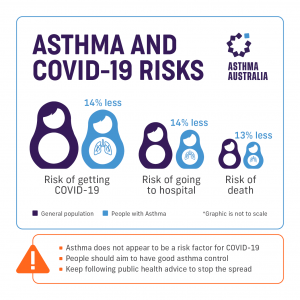Asthma Australia has been referenced in a brochure, “Covid-19 vaccinations for children: What is the right choice? Top 10 Reasons to stop, think & consider” by US run organisation, Children’s Health Defense® – Australia Chapter.
Asthma Australia is not affiliated with this organisation or any organisation that promotes an anti-vaccination message towards COVID-19.
Read our official statement here.
A study commissioned by Asthma Australia has revealed surprising results on the risk of COVID-19 infection for people with asthma.
The study was commissioned by Asthma Australia during the first outbreak of COVID-19 in Australia, to answer the question that was worrying many people with asthma and their families; am I more at risk of acquiring COVID-19? Should I self-isolate? And if I get it, will I die?
The global study completed by the George Institute of Global Health reviewed 58 peer-reviewed publications from across the world, capturing the data of half a million people who have contracted COVID-19 from Asia, Europe, and the Americas, to see if they could answer the question if people with asthma are more at risk of acquiring COVID-19 or of poorer outcomes.
The findings from this study suggest that people with asthma don’t appear to be at greater risk of acquiring COVID-19 than the rest of the population.
“Most people with asthma are not contracting COVID-19 at all and if they do, they are equally likely to recover,” says CEO of Asthma Australia Michele Goldman.
“This was hinted early on when COVID-19 presentations for people with asthma seemed lower than expected.” 

The study showed that for people with asthma, compared to those without asthma, there was a lower risk of acquiring the COVID-19 infection (by 14 percent), and a lower risk of being hospitalised with COVID-19 (also by 14 percent).
The question that was worrying everyone, ‘am I more likely to die?’, may be somewhat less concerning for people with asthma, with the risk of death being 13 percent less, compared to people without asthma.
Asthma Australia says having concrete answers is reassuring but they note the data is historical based on what has been, and it is not a forecast.
The peak health body wishes to emphasise that there is no single accepted theory explaining these results, and more research may be warranted.
“This is good news for people who have asthma, almost a sigh of relief for what has been a very stressful time with unanswered questions,” Ms Goldman said.
“But we aren’t out of the woods yet. Everyone must continue to follow public health advice and take recommended protective measures for COVID-19, whether they have asthma or not.
“If you have asthma you should always take steps to control it as best you can.”.
For people with asthma, protective measures such as good personal hygiene practices will protect them from other viruses that may be circulating, which are usually problematic for asthma control and can lead to flare-ups. However, extreme precautionary measures such as self-isolation for 12 weeks may be unnecessary for the vast majority. Again, it is important we all follow the advice provided by Australian health authorities.
This study has been funded by donations to the Asthma Australia Research Fund, a fund developed to continue progressing our knowledge and understanding of asthma and discovering new ways people can live a life uninhibited by asthma.
The research paper and further information can be viewed here.






